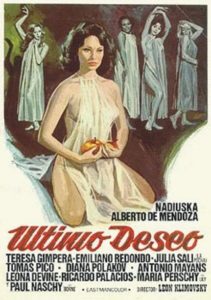 Spanish genre-bending silliness from the seventies about horny folks trapped inside a mansion in the wake of a nuclear war. Packed with outrageous seventies fashions and a muted political conscience, the film is goofy fun, provided you’re in a forgiving mood.
Spanish genre-bending silliness from the seventies about horny folks trapped inside a mansion in the wake of a nuclear war. Packed with outrageous seventies fashions and a muted political conscience, the film is goofy fun, provided you’re in a forgiving mood.
The director of PEOPLE WHO OWN THE DARK (ULTIMO DESEO; 1975) was Leon Klimovsky, one of the key figures in the Spanish horror boom of the seventies, which included the iconic Jess Franco, as well as Vincente Aranda (THE BLOOD-SPATTERED BRIDE) and Eloy de La Iglesia (CANNIBAL MAN). Their films tended to mix sex, religion and politics while delivering the requisite cheap thrills demanded from a movement born of financial necessity, and PEOPLE WHO OWN THE DARK was no exception.
Klimovsky was known for his genre-mixing, in films like I HATE MY BODY and the enormously successful WEREWOLF VERSUS THE VAMPIRE WOMAN. The present film continues this tradition in the way it juxtaposes NIGHT OF THE LIVING DEAD-style thrills, cold war paranoia and a disquieting political angle. It’s also notable as one of the many, many starring vehicles for the Spanish genre superstar Jacinto Molina, a.k.a. Paul Naschy.
A group of swingers arrive at a mansion for a weekend of debauchery. They manage to get in some amorous sex and a satanic ritual in the basement before the power abruptly goes out. One of the partygoers hears on his battery-powered radio that there’s been a nuclear explosion. Several of the group decide to explore the countryside, and discover a ravaged landscape packed by hundreds of desperate people who’ve all gone blind from the atomic blast.
Back at the mansion a man succumbs to radiation poisoning and dies. Two more of the guests, a man and woman, decide to take off for good in the dead guy’s car, but end up waylaid by a group of homicidal blind folks who beat them to death. The blind mob then heads for the mansion, where the surviving members of the party arm themselves with guns. This proves useless against the blind horde, and so a plan is hatched to escape through the catacombs underneath the mansion. It seems to work, as the partygoers manage to flee through them and end up in a rural area the next morning—but there’s still a crowd of blind maniacs itching to kill them off. An all-out slaughter is inevitable, though two of the party run off into nearby swampland, which leads to a road where the survivors flag down a bus manned by radiation-suited men. It seems the two are saved, but in reality they’ve blundered into the most dangerous situation yet.
If you like goofy seventies music and fashions then this film is for you, as it overflows with both. It’s probably best enjoyed as a simple time capsule entry, because as exploitation it leaves much to be desired: there’s little in the way of bloodletting (despite the many deaths), and even the sex scenes are over with quickly. The opening section, which takes up over twenty minutes of the protagonists driving to and entering the castle that serves as the film’s central location, is interminable—there are endless shots of people getting in and out of cars and then chatting before the nuclear explosion hits (off-screen) and the good stuff begins. But it’s not all that good: blind people aren’t terribly effective as objects of terror (think NIGHT OF THE LIVING DEAD with visually impaired folks in place of zombies and you’ll have the gist of this film), and Klimovski’s presentation of a post-nuclear world is never very convincing. For me the only real jolt came near the end, in which two of the main characters find themselves in a sticky situation organized by the authorities, closing things out on a deeply grim, and deeply political, note.
Vital Statistics
THE PEOPLE WHO OWN THE DARK (ULTIMO DESEO)
Jose Luis Renedo Tamayo/Newcal
Director: Leon Klimovsky
Producers: Jose Luis Ranedo Tamayo, Salvadore Romero
Screenplay: Gabriel Burgos, Joaquim Jorda
Cinematography: Miguel Fernandez Mila
Editing: Soledad Lopez
Cast: Paul Naschy, Nadiuska, Alberto De Mendoza, Tony Kendall, Ricardo Palacios, Leona Devine, Antonio Mayans, Diana Polakov, Tomas Pico, Julia Saly, Emiliano Redondo, Teresa Gimpera, Maria Perschy
